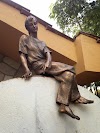This week, across South Africa and across the world, a wide range of religious groups are joining together to back ‘Exposed’, an ecumenical effort to challenge the scourge of corruption. Our own bishops have welcomed the campaign. They are encouraging each of us to join individually and collectively in the fight against corruption. Many parishes are planning a prayer service or an action or a protest as part of the Global Vigil Against Corruption between 14-20 October. Find out what’s happening in your local community and join in.
But why are Church people taking such an interest in this?
Corruption is fundamentally about benefitting illegally from power whether you are a national President or a local traffic cop. One way to explain corruption is a formula:
C = P + D – A. ‘Corruption’ occurs where authority figures enjoy ‘Power’ and ‘Discretion’ without ‘Accountability’. If a person or an institution has power and uncontrolled discretion over goods or services (or fines or tenders), and they feel that they are accountable to no one, corruption is likely to occur. But corruption also requires lack of accountability – because of our inactivity or silence.
The Bible gives us a great example of corruption – not in ‘bad guys’ like Cain or Judas or Pilate, but in the Lord’s own chosen one, King David. He used his power as king cynically to seduce Bathsheba and then exercised his discretion to send Uriah her husband to his death on the frontlines so he could marry Bathsheba (2 Samuel 11: 1-27). However, when the prophet Nathan challenged him, he repented his actions. He recognised that though he had enormous discretionary powers, God’s power was greater. David was an example of a corrupt official; Nathan a prototype of anti-corruption watchdogs who speak truth to power. We as the Church are called to follow the example of Nathan.
Corruption exists to varying degrees in all countries, and has to be challenged both locally and globally. Transparency International shows that the least corrupt countries are democracies that have regular free elections, stable government and an independent system of justice. We have all those and yet, between 1995 and 2013, South Africa has plummeted from being among the less corrupt countries (in the mid-20s) to join the increasingly corrupt countries (in the mid-60s out of 140 countries).
Catholic Social Teaching, including the recent African Synod, has increasingly cited corruption as a source of moral concern. Corruption undermines good governance and democracy. The common good is not served when basic rights and social justice can be bought and sold by the powerful – whether by elected politicians, appointed public administrators, or self-serving business leaders. Corruption perpetuates social inequality and unfair access to public goods and services, making the poor poorer and even more marginalised. Corruption literally puts economic and social rights ‘up for sale’. Every time I refuse to ask for a bribe, or refuse to pay a bribe, or speak out about a situation of bribery, I am shining a light on corruption.
For more Jesuit Institute perspective go to www.jesuitinstitute.org.za.




